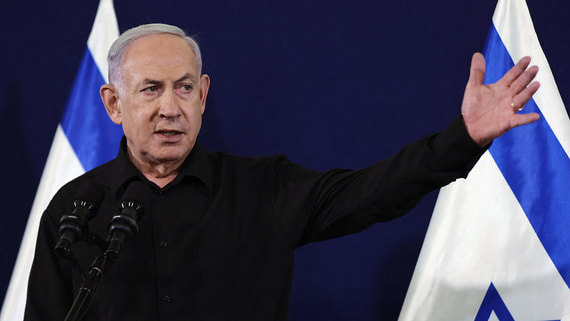Israel allows occupation of Gaza after military operation ends
[ad_1]

Israel may take “responsibility for security” in the Gaza Strip “for an indefinite period” to prevent the radical Islamist group Hamas from maintaining or returning to power. Israeli Prime Minister Benjamin Netanyahu stated this in an interview published on November 7 with the American television channel ABC News.
“I think that Israel will, for an indefinite period of time, bear overall responsibility for security [в Газе]. Because we have seen what happens when we don’t have it, a surge in terrorism from Hamas to a degree we could not have imagined,” he said. In his opinion, Israel “will have a role” in managing the enclave after the fighting ends.
In October, Israeli Defense Minister Yoav Galant said that a “new security reality” would be established in the Gaza Strip. On October 31, the Netanyahu administration acknowledged that military intelligence had developed a plan to evict Gazans to Egypt and other states, establishing a “sanitary zone” that would prevent returns.
At the same time, the Israeli Prime Minister’s Office noted that this plan was not considered in detail and is only one of the options. Egypt and other Arab countries have protested against any attempts to evict Gazans.
US President Joe Biden, recognizing Israel’s right to self-defense, noted on October 16 that the direct occupation of Gaza would be a “big mistake.” Secretary of State Antony Blinken denied that was an option.
Coordinator of Strategic Communications of the US National Security Council John Kirby reported on November 6 that Washington is holding consultations with Tel Aviv and partners in the region on the post-war future of Gaza. At a meeting with Palestinian National Authority (PNA) head Abbas on November 5, Blinken raised the issue.
According to The Washington Post, the Secretary of State said at a hearing in the US Senate that the most preferable solution would be to transfer control of the enclave to the PNA authorities. Abbas noted that he is ready to take on this function, but only within the framework of a comprehensive political decision. Hamas seized power in Gaza in 2007.
As a result of this war, the establishment of military control over Gaza by Israel is not excluded, agrees program coordinator of the Russian International Affairs Council Ivan Bocharov. The expert recalled that Tel Aviv had occupied the enclave since 1967, until then-Prime Minister Ariel Sharon withdrew troops in 2005 as part of a unilateral disengagement.
“It’s still difficult to talk about control parameters. But the presence of the Israeli army will at least cause an increase in underground activity and terrorist attacks. And Hamas may still have some leverage; a significant part of the youth in Gaza are supporters of the movement,” the expert continues.
At the same time, the transfer of Gaza under the control of the PNA will also cause discontent among its residents, says orientalist Ruslan Suleymanov. According to the expert, Abbas’s rule in the West Bank is perceived by a significant number of Palestinians as part of the Israeli occupation.
Netanyahu, in an interview with ABC News, noted that a complete ceasefire in Gaza is impossible without the release of Israeli hostages taken by Hamas during the October 7 attack. According to the Israeli side as of November 7, there are 241 of them. “There will be no ceasefire, no general truce in Gaza without the release of our hostages. But tactical short pauses, an hour here, an hour there [да]. I don’t think this will be a general truce,” the Israeli prime minister said. In his opinion, this will only “interfere with military efforts to free the hostages.”
On November 6, American and Israeli leaders held talks on possible humanitarian pauses. Blinken also visited the region on his tour with this mission. Kirby said on November 6 that the White House expects negotiations on this topic between the parties to the conflict to begin.
Israel’s likely readiness for humanitarian truces in Gaza may result from pressure from neighboring Arab countries and Washington, Suleymanov believes. The White House, having given the green light to Tel Aviv for the operation, is now trying to persuade it to at least a short-term truce and the opening of humanitarian corridors, which was noticeable during Blinken’s tour. “But neighboring Arab countries are opposed, because, from their point of view, this would mean a new “Nakba” (the expulsion of Arabs from part of Palestine in 1948 – Vedomosti),” says the expert.
According to Suleymanov, the establishment of a supranational administration under a UN mandate through the mediation of neutral states, as in 1999–2008, could reduce the severity of the Gaza problem. in Kosovo. Bloomberg reported the possibility of such a scenario. The Wall Street Journal wrote on November 2 that Blinken was allegedly negotiating with Arab countries.
Publicly, the Secretary of State said that he allowed for the scenario of participation of “certain countries and organizations.” But, as Al Arabiya reported on November 2, citing sources, Egypt has already rejected the proposal for international and Israeli governance of Gaza. “Any other government, other than a supranational administration under UN control like Kosovo’s, will be perceived by the local population as an occupation structure,” Suleymanov believes.
[ad_2]
Source link








